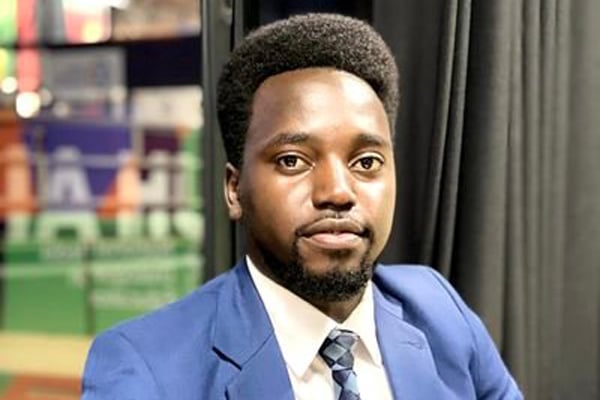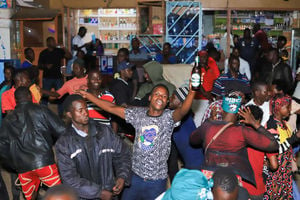
Western Uganda artiste Ray G pulled a historical crowd at Lugogo Cricket Oval. PHOTOS /COURTESY/ISAAC SSEJJOMBWE
Artistes in Uganda, especially those based in Kampala, have enjoyed the central language, diversity of producers, and crowds, which are equivalent to popularity and everything that comes with the ‘big city vibe.’
Majority of the ‘big’ artistes in the music industry specifically, have for a while been known to base in the capital, Kampala, most of them singing in Luganda, while some mix both Luganda and English.
This trend has, however, started to see dynamics shifting from the traditional ‘city’ musicians electrifying the masses to a new breed of artistes from different parts of the country proudly singing and entertaining masses in languages from different regions.
Before you get it twisted, the regions far away from the city have always had good artistes, some heard out loud, but with the shift in dynamics as evidenced in the past few years, the country is beginning to notice and take more seriously regional (local) artistes who stand out, regardless of whether they actually understand the language or not.
A good example in this analysis would be western Ugandan singer, Ray G, who has had his successes over time and recently shut down Lugogo Cricket Oval with a concert that saw revellers from all corners of the country, and a good number of those travelling from western Uganda.

XED 256
XED 256
The shift in such dynamics is what equally introduces 28-year-old Edward Muligirwa who goes by the stage name XED 256 in the picture, and into the mainstream music industry massively and unapologetically.
XED 256, famed for his famous slogan, Fort Portal Ni Dubai, which he likes using to portray and show the beauty of African spaces, particularly Fort Portal for him, which is his home area, had his debut music premiere dubbed Miswa Music Premiere on June 3 at MCI Media Hub.
Having hailed from Fort Portal, XED 256 carries a lot of passion for his cultural heritage and sees massive potential in his hometown and the local Tooro language, which he knew he would amplify at some point.
“I was born in Kyenjonjo, my mom comes from Mbarara. I use the ‘Fort Portal Ni Dubai’ slogan in my music to portray the beauty of Africa. I want to use where I originate from to show the beauty of the continent and for a place like Fort Portal, you just have to appreciate that beauty,” XED 256 said.
XED 256 started his music career in 2015, where he recorded his first song titled Marry You, which was fully sponsored by his mother.
“I want to be that person whom people know as the Music Messiah in Tooro,” XED 256 said on being intentional about his brand.
Having settled in Kampala now, learning Luganda has been inevitable in his career path and target audience, so he knew he would have to strike a perfect balance.
He says he has blended his music to accommodate more regions beyond just Tooro.
“Now I sing for many people, so I blend my music in several languages. I sing in Rutooro, English, Runyankore, and Luganda. I mix them all up. I rap and sing,” XED 256 said.
Media Challenge Initiative
With a professional background in the hospitality industry as a renowned barrister and mixologist in town, XED 256 would later accelerate his music ambitions when he walked into the Media Challenge Initiative (MCI) Media Hub in 2021 as a barrister.
XED became famed for his hit new single Eddie Beibe, commonly known as Omwaana Omulabye produced by Ricky C, and the video shot by Pius Gyagenda, which became his breakthrough in the industry and captured the attention of the masses.
XED 256 has released more hits such as Ninkugonza, Niiwe, Kumba, Adyeeri, Libido, Eddie Beibe, and his latest hit Misuwa, which was the theme for his premiere on June 3.
In our interview, the singer mentions his mother’s passing after his big debut performance last year.
The singer continues working as a barrister at the MCI Media Hub and has a company named Kanuzi, which deals with door-to-door and outdoor drinks service to be able to finance most of his music.
“I also work with 360 UG, which is a video booth company owned by Abaas Mpindi and it has been my biggest sponsor as well,” XED said.
He further adds that he had a complete mindset shift when he entered the MCI environment and observed how people were earning from their talents and the content they made.
“When I reached Media Challenge Initiative, I realised that people were making money from just talking. They were earning from content they make, such as journalism and other work. Because of the amazing people I met, and their way of thinking, I realised that I also had way too much to put out there and I realised I had to make this happen, so I decided to put myself fully out there,” XED 256 said.
He added that Mpindi, who is also the CEO of Media Challenge Initiative, has been a major stepping stone in his mileage.
“Mpindi took me to MCI and introduced me to many amazing people who have helped me with my music. He has mentored me, and supported me every step of the way. He also taught me how the general media industry works,” XED 256 added.
Mpindi, says the support MCI provides to XED 256 is part of their work in amplifying young Ugandan talents.
“XED 256 benefits from our intentions as a media platform to amplify young Ugandan talents, especially those that are rural-based and lack access to structures that can promote their musical talents. We recognise now that due to the concentration of financial, technical and human resources in the city, regional creatives struggle to build their craft and monetise it. Though our work has primarily focused on building the next generation of journalists and incubating media innovators, we have decided to go beyond journalism to use the power and structures of the media that we have to amplify other creatives. We are creating an ecosystem where journalism is an enabling facilitator by being both a watch and guide dog,” Mr Mpindi said.
Regional artistes
On the plight of regional artistes in navigating regional recognition, Phina Masanyalaze, the secretary general of the Uganda Musicians Association (UMA) and vice chairperson of the National Theatre, says there are ongoing efforts by UMA to address the challenges faced by regional artistes in Uganda.
“To help these artistes gain national appeal and navigate the industry more effectively, several initiatives have been implemented by leaders of music in Uganda, including;
Talent development programmes: UMA has organised workshops and training sessions to help regional artistes improve their skills, understand the music business and increase their marketability.
Promotion and exposure: UMA has partnered with media outlets and event organisers to provide platforms for regional artistes to showcase their talent on national stages and media channels. This includes organising concerts and featuring regional artistes in national events.
Mentorship and networking: Established artistes and industry professionals have been engaged to mentor upcoming regional artistes, offering guidance on career development, branding, and networking within the industry.
Policy advocacy: Leaders in the music industry, including Masanyalaze, have been advocating for policies that support fair treatment and opportunities for regional artistes. This includes pushing for better copyright laws and equitable distribution of royalties.
Financial support and grants: Efforts have been made to secure funding and grants for regional artistes to produce and promote their music, ensuring they have the resources needed to reach wider audiences.
Regional Music Hubs: There has been a push to establish music hubs and recording studios in various regions to provide artistes with access to professional production facilities without the need to travel to the capital.
These efforts aim to create a more inclusive and supportive music industry in Uganda, ensuring that regional artistes have the opportunity to succeed and gain national recognition,” Masanyalaze elaborated.
XED 256 reveals his plan to own a record label, which in fact, he has already started digitally and has signed other regional artistes to help advance their music careers as well.
“In the next five years, I see myself having a label that helps artistes distribute and earn from their music. I may not be a celebrity yet, but I am earning from my music on Apple Music and other stream sites. I have knowledge that some people with very nice music upcountry do not know. I started with one artiste from Hoima, Geno Rapper, whom I signed digitally in my XED catalogue and he is becoming very recognised in Hoima and beyond. There is that order and organisation that professionalises the industry when artistes are in a formal arrangement,” XED said.
He calls on his fellow artistes and the media spaces to engage with one another.
“It starts with us as the artistes to put ourselves out there until you notice us. We also need engagement from the media. Give us media coverage, especially the rural/local artistes. Not just when major Kampala artistes are coming upcountry, say Tooro, but also get Tooro artistes and engage them. Host us on your talk shows, engage us musically, be it in the news, be it influencing, conferences and others,” XED 256 said.
XED 256 says...
We also need engagement from the media. Give us media coverage, especially the rural/local artistes. Not just when major Kampala artistes are coming upcountry, say Tooro, but also get Tooro artistes and engage them. Host us on your talk shows, engage us musically, be it in the news, be it influencing, conferences and others.






